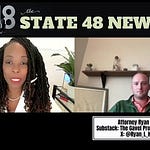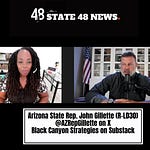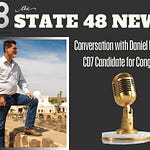Legacy media is losing its grip, newspapers are shuddering and independent voices are rising from digital platforms. State 48 News sat down with two veterans who have navigated both politics and media from the inside. The conversation, hosted by Christy Kelly, explored what it really takes to build a career in political communication today—and whether journalism is still worth the fight.
Rachel Alexander is a seasoned conservative journalist, attorney, and editor who has spent over two decades at the crossroads of law, media, and politics. She is the founder and editor of Intellectual Conservative, a publication she launched in 2002 that has since become a hub for analysis on election integrity, judicial reform, and conservative thought.
Before entering journalism full-time, Alexander served as an Assistant Attorney General for the State of Arizona, a Deputy County Attorney in Maricopa County overseeing elections, and a corporate attorney for GoDaddy. Her background also includes experience as a gun magazine editor and a staffer for Congressman David Schweikert, grounding her reporting in both practical law and real-world political operations.
Her writing has appeared in outlets including Townhall, WND, The Arizona Sun Times, and The Christian Post. Educated in Political Science and History at the University of Washington, Alexander later attended law school at Boston College and the University of Arizona, where she led the Federalist Society. Over the years, she has become one of the right’s most recognizable voices on election law, lawfare, and media bias—praised for her detailed, methodical approach to complex political issues.
Ajay Bruno brings a complementary perspective—from the inside of campaigns, communications firms, and political consulting. He has represented a wide range of clients, including FreedomWorks, the Indian Ambassador to the United States, the Polish Consulate-General in New York City, The Federalist Society, Regnery Publishing, and Hachette Book Group, as well as public figures such as Judge Jeanine Pirro, comedian Terrence K. Williams, and presidential adviser Doug Wead.
Before moving into full-time public relations, Bruno built his foundation in political strategy and writing, contributing to The Hill, RedState, Washington Examiner, and Bold. He also produced and hosted a political podcast that featured interviews with authors, elected officials, and cultural commentators.
His campaign experience runs from local races to the national stage—most notably serving as New Hampshire State Director for Michele Bachmann’s presidential campaign. Today, his work focuses on message discipline, media placement, and reputation management, helping clients navigate an era where the lines between politics, publicity, and identity are constantly shifting.
Together, Alexander and Bruno represent two sides of the same modern conservative coin. One forged in law and journalism, the other in persuasion and strategy.
Why They Chose the Arena
When asked how they found themselves in politics, both traced their passion back to early roots.
For Bruno, politics was less a calling than an evolution.
“I’ve always had an interest in history and campaigns,” he said. “I was probably angry when Clinton beat Dole—that’s probably when it started.” What began as curiosity became a career that blended political strategy, writing, and media relations. Bruno has worn nearly every hat the business offers—from campaign work and punditry to public relations and crisis management. “I find it enthralling,” he admitted. “It’s the people who ruin politics. The system itself, the challenge and the competition—is something I’ve always enjoyed,” Bruno said.
Alexander’s entry point came through words, not rallies. Her parents subscribed to National Review back when it was unapologetically conservative.
“We weren’t allowed to watch TV or go to movies,” she laughed, “so I just read.” By the time she reached law school, she was already writing about policy and politics, and in 2002, she founded Intellectual Conservative. “It was my way to keep William F. Buckley Jr.’s legacy alive,” she explained. “National Review had gone squishy, so I wanted a place where people could still read strong, principled conservatism,” Alexander recalled.
For both, politics was about participation. Bruno’s love for messaging strategy and Alexander’s obsession with truth-each stem from a shared conviction that politics still matters because information still matters.
Is It Still Worth It? Advice for the Next Generation
With so many young people disillusioned by the toxicity of politics and the collapse of traditional journalism, Kelly asked : Is it still worth getting into this business?
Bruno didn’t sugarcoat it.
“It’s a difficult world to get into. Like anything else, it’s about who you know,” he said. The old paths of party internships, local races, think-tank jobs—still exist, but the landscape has changed. “It used to be more civil,” he explained. “Now, you have to really want it. If you like anything else, do that. But if this is what drives you and if it’s really in your blood—then go for it. Just make sure you’re doing it for the right reasons. Politics is supposed to be public service, not self-service,” Bruno explained.
Alexander, speaking from the journalist’s side, painted a similarly stark picture.
“You’ve got to have a thick skin,” she said. “Last year before the election, I was being called the C-word on X once a week.” Between online harassment, layoffs, and the rise of AI-generated content, she said journalism has become an endurance sport. “It’s not just about reporting anymore—you have to become an influencer. You have to build your audience, promote your own work, and sometimes even defend it in real time,” Alexander said.
The old newsroom have turned into independent platforms, subscription models, and personal brands. Alexander said that’s both a threat and an opportunity: “Only a handful of people are going to become a Megyn Kelly. But that doesn’t mean you can’t build something meaningful. You just have to be realistic about what that looks like.”
When the conversation turned to education, both were pragmatic. Alexander pointed out that not every success story begins with a degree. “Look at Jordan Conradson from Gateway Pundit,” she said. “He became one of Arizona’s most recognized reporters at nineteen—no college degree.” Still, she sees value in higher education when it’s used the right way. “If you go to the right college and take the right courses, it can teach you how to think, not just what to think.”
Bruno agreed—mostly. “Universities have become propaganda mills,” he said, “unless you’re somewhere like Hillsdale. You’re paying to be indoctrinated. But if you can find a school that actually sharpens your mind, then sure—it can help open doors.”
In the end, the consensus was clear: both journalism and politics are still worth entering but only if you understand what they’ve become. The gatekeepers are gone, for those who are willing to work and fight for truth in a noisy world.
Building a Brand in the Age of X
If the previous generation built résumés, today’s builds brands.
For Bruno, branding is equal parts authenticity and amplification.
“You have to find your niche and stay consistent,” he said. “Work with people who can put you in the right places, and promote your strengths.” His experience with clients like Terrence K. Williams illustrates how humor, personality, and politics can intersect into something commercially powerful. “He already had a big following,” Bruno recalled. “Our job was to help him refine it, expand it, and connect with larger audiences,” Bruno said.
Alexander, on the other hand, has lived the social media roller coaster firsthand.
“Under the old Twitter, I was suppressed. I was hemorrhaging followers,” she said. “When Elon Musk took over, he started promoting independent journalists who had been buried before—and that changed everything.” Her growth on X, where she now reaches hundreds of thousands of followers, came from consistency and focus. “If you post about one issue for six months straight, you become an expert in that field. The algorithm rewards that,” Alexander said.
Both guests agreed that conservative media figures have to promote themselves aggressively. “If you don’t reinvent yourself and push your brand, you’ll die,” Alexander said bluntly. “This isn’t the era of editors discovering you—you have to market yourself.”
The Media Gap on the Right
When the topic turned to conservative messaging, Kelly noted the irony: conservatives often complain about media bias but fail to amplify their own journalists. “You can’t say mainstream media is dead,” she said, “and then ignore the independent outlets doing real work.”
Alexander didn’t disagree. “I can’t tell you how many times I’ve written flattering stories about politicians who never repost them,” she said. “They’ll go give quotes to mainstream reporters who hate them—but they won’t support their own.”
All agreed that the left’s communication discipline remains unmatched. “They coordinate their message,” Alexander said. “There’s literally a Slack or chat group somewhere that decides what the talking point of the day will be.” Conservatives, by contrast, often work in silos. “A few years ago, I tried to start a network where right-leaning journalists could coordinate stories and talking points,” she added. “I got nowhere. No funding. No support.”
The takeaway: if conservatives want to compete, they must learn not just to speak truth, but to amplify it together.
Reading Polls and Spotting the Spin
The conversation eventually shifted to polling validity. Kelly asked what every candidate and journalist wants to know: how do you tell which polls are real?
“Be skeptical,” Bruno said. “Polls can be useful, but they’re often slanted by the way questions are asked or who’s paying for them. The only poll that matters is the one on Election Day.”
Alexander agreed, adding that many polls are designed to shape opinion, not measure it. “Some are called ‘push polls,’” she explained. “They frame questions to lead you toward a certain answer. That’s not measuring sentiment. That’s propaganda.”
Alexander cited Noble Predictive Insights, a polling firm she says often favors establishment candidates. She argued that its surveys always show the traditional Republicans ahead. (Okay, full disclosure—that’s not the exact “R” word she used, but State 48 News has banned itself from printing the other particular pejorative.)
Both encouraged readers to check methodology, sample size, and funding sources before trusting any headline. “A candidate can literally hire a pollster to produce a narrative,” Kelly added. “That’s something a lot of people don’t realize.”
Third Parties and the Arizona Landscape
As the conversation turned toward Arizona, Kelly raised Arizona’s shifting voter registration numbers and the rise of independents. “Are third parties going to shake up 2026?” she asked.
Alexander doesn’t think so. “Independents in Arizona are about evenly split between those who vote Republican and those who vote Democrat,” she said. “People panic when they hear independents are growing, but it’s mostly a branding issue. Many of them are conservatives who just don’t like the party label.”
Bruno added that tailoring the message matters. “Arizona used to be solid red. Now it’s more purple—or at least some people like to think so,” he said with a grin. “But the right message can still win: focus on the economy, border security, and common sense. Those issues aren’t partisan, they’re American.”
Reflections and Regrets
To close the podcast, Kelly asked both guests what they would do differently if they could start over.
“I wouldn’t have jumped straight into running for statewide office,” Kelly admitted. “I stepped into quicksand not knowing how powerful APS was or how the factions really worked. I would’ve written my book first and learned the landscape better.”
Bruno said he would have chosen his geography differently. “I should’ve gone to a conservative college, built those connections, maybe started in a red state. Instead, I went straight to D.C.—not the best move if you want to run somewhere else.”
Alexander, ever the realist, smiled. “I wouldn’t have gone to law school. I thought I’d practice for two years and then become a senator. Instead, I found my home in journalism. I love it, even if it’s the hardest job I’ve ever had.”










